Mr. Asaad Haddad (hereafter, Mr. Haddad) is a JISR second batch graduate who currently works as an engineer at a company in Osaka, Japan. Most of JISR participants find employment and continue to stay in Japan after completing the program due to circumstances in their home country, and Mr. Haddad is one such case. He studied applied mechanical engineering on a master’s course at Ritsumeikan University's Graduate School of Science and Engineering and is working for Dainichi Hanso Co., Ltd. This company was established in 1959 (originally Dainichi Plastic Industry Co., Ltd.) and has an extensive track record as a long-established manufacturer of conveying equipment such as screws and bucket conveyors for conveying grains and powders. Currently, the company leverages its conveying technology to manufacture and sell machines which makes possible to control the transportation of variously shaped objects from raw materials to finished products that arise in processing processes in a variety of fields, including not only grains but also pharmaceuticals. In this interview, we visited the company's Osaka headquarters and spoke with Mr. Haddad as well as Mr. Tsuyoshi Hirami, the President and Representative Director of Dainichi Hanso Co., Ltd.
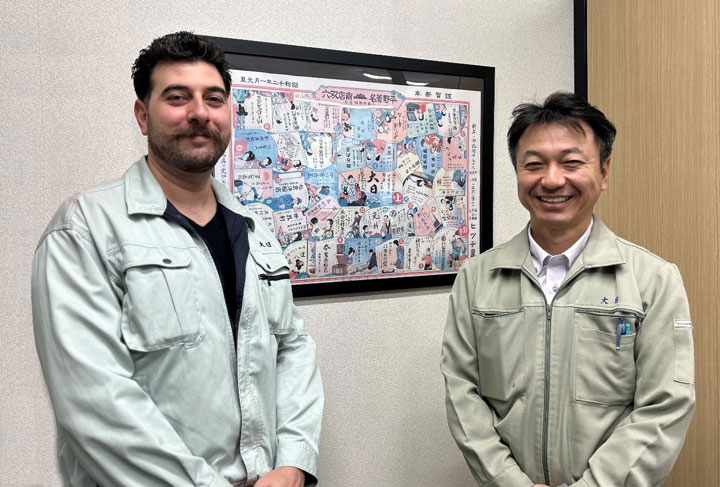
Mr. Tsuyoshi Hirami (right), President and Representative Director, and Mr. Haddad (left) standing in front of a newspaper advertisement (with Dainichi written in the center of a “sugoroku” game board) from the time when the company was a rice wholesaler (1937).
Mr. Tsuyoshi Hirami, President and Representative Director, Dainichi Hanso Co., Ltd.
What is the company's business, and what capabilities do you require of your employees?
We have been making machines for conveying grains and the like since the company was founded, and I am the third-generation president. Since our products can already be found almost every setting where grain conveying machinery is needed, we need to consider new areas and enter new markets to further expand our business. Therefore, with the aim of "eliminating losses at manufacturing sites", we would like to make proposals that meet the needs of the factories, etc. of our customers who use our conveying machinery. The key is to be able to find out what users are looking for, get involved with the people on the ground, flexibly analyze the current conditions, and uncover issues. I believe that employees need to keep taking on new challenges, to take hints from new things, and to have the ability to materialize ideas. It is also important to have fun at work.
In what ways does Mr. Haddad contribute to the company?
Asaad(Mr. Haddad)has unwavering mechanical and electronic engineering skills and has done everything from designing machines to building prototypes for us. Right now, he is working on developing a robot to clean the insides of pipes. Because the powders adhere to pipes of conveying machinery, they need to be dismantled entirely and cleaned by hand on a regular basis, and this is a major cost in production. A cleaning robot can remove the powder before it adheres, and a camera attached to the robot can identify areas that need to be dismantled and cleaned, thereby cutting costs. Such a machine does not yet exist, and we asked Asaad to build a prototype for us. There are still some issues to be addressed for practical application, such as making the robot itself dustproof and waterproof, and devising a rescue method in case the robot makes errors, but he is doing a good job. I expect him to be involved in our traditional work of conveying machinery manufacture and installation. I hope that he experiences holding discussions with users and finds new needs from his own viewpoint. I also want him to learn metalworking and eventually to become the head of our design department.
How did you start accepting foreign personnel?
After I became president, we had been thinking of expanding our business into Russia and Central Asia that export grains produced in Ukraine and Russia. We were looking for personnel who could speak English and Russian, but we couldn’t afford to employ Japanese people with foreign language skills due to the high salaries they demand. At that time, I realized that it would be a good idea to hire native speakers of foreign languages, even if they could not speak Japanese well. In the end, we hired a national of Kyrgyzstan who was fluent in Japanese, Russian, and English. At first, I was worried that she might soon quit, but now she has become a very good and reliable employee. It was from that employee that I learned about the usefulness of internships for foreign nationals. By working with people from different languages and cultures for a certain period, Japanese employees are exposed to new ways of seeing and thinking, and at the same time, we can receive advice from interns who have their own expertise. Then, we started accepting foreign interns on a trial basis, and accepted students from Central and South America in 2018 through the METI/JETRO program, and from Kazakhstan the following year. We also had several fellows of JICA scholarship program from Senegal, South Africa, Benin, Pakistan, and other countries. They all excelled in their respective fields and produced such as a Chatbot for receiving orders and a device for monitoring conveyor conditions and sending out alarms.
What has been your most memorable experience with Mr. Haddad?
Around the time the foreign internship program was becoming established, I was introduced to the JISR program whose participants were seeking to find employment after leaving graduate school and I met Asaad who had participated in an internship. At that time, we had not yet considered hiring interns. As a matter of fact, I thought Asaad’s technical skills were so high that he would be too over-qualified for our small company. When I interviewed him, I told him about our business concept and asked him if he could do it. Then, he carefully answered what he could do and couldn’t do with his technical capabilities, and what he might be able to do if given time to overcome difficulties. Normally, when people promote themselves in situations where they want to get a job, they tend to say, "I can do this, I can do that," and show only the good parts of themselves. But he was not like that. He was realistic and honest in his analysis of his abilities. That kind of sincere and artisan-like temperament impressed me, and I knew I could trust him. Also, when we had dinner together and I talked about my business plans and dreams, Asaad said to me, "Use me to make your dreams come true”. I thought that was admirable. That's what I remember most. So, we decided to have him work for us. He is always eager to learn and can do a very wide range of things, and I am always impressed at how he manages to do such amazing things all by himself. We expect much from Asaad's technical and creative abilities in developing machines to meet numerous needs, such as machines that can clean the rear side of conveyor belts and devices that can operate in three dimensions to convey granular materials.
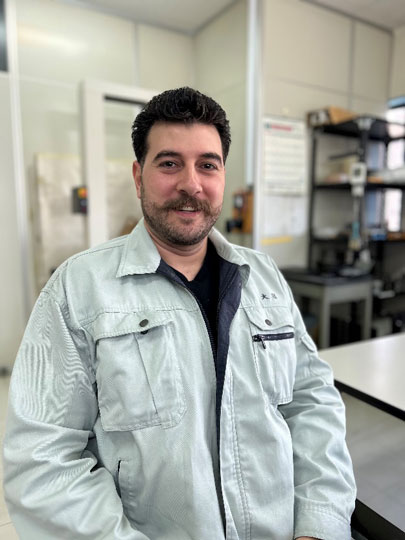
Mr. Haddad in company working clothes during the interview.
Mr. Haddad
Tell us about your current work.
My current job is to build electronically controlled machines such as robot arms. I like making new things and I enjoy my job very much. I originally studied mechanical engineering at university before coming to Japan on the JISR program, where I acquired basic skills and knowledge, and I also did related work. At graduate school, I did research on prosthetic hands. I learned more advanced technologies such as 3D printers and used those skills and knowledge to create prototypes. What I am doing at the company now matches my area of expertise perfectly, and I am very satisfied with my work.
The company is a well-established, purely Japanese company that has been around since the 1950s. There are 15 staff members including 6 foreign staff from various countries such as Vietnam, Thailand, the Philippines, and Kyrgyzstan, and me, Syria. Some of foreign staff cannot speak Japanese at all. The Kyrgyz staff member speaks fluent Japanese and acted as my interpreter when I started working here. None of the Japanese staff members speak English, but I can speak in Japanese if the content is simple. Sometimes I have challenges in communicating with them, but it is not a problem. We have good relationships with each other in the workplace.
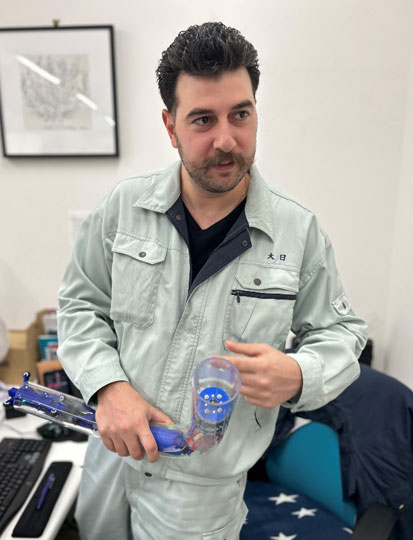
Mr. Haddad talking about his prototype of pipe-cleaning robot.
What has been the most memorable part of your job?
It was when I participated in an exhibition. I showed a video of the pipe-cleaning robot I had designed, and people were quite interested in it. It is still under development, but it is a robot that cleans inside small-sized pipes. It can be controlled with a tablet and runs on batteries. Another good experience was attending the International Trade Fair for Food Technology (Anuga FoodTec) held this March in Cologne, Germany. Various cutting-edge food processing machines were introduced, and I was exposed to new technologies, which I found stimulating in a beneficial way and I came up with ideas for new products. I also interpreted for my colleagues at the exhibition. It was a very fresh experience for me to get to know German people and their culture.
What is your dream for the future?
I have not yet decided on the specific timing, but I would like to apply for Japanese naturalization in the near future. I am eligible to apply for that because I have lived in Japan for 6 years, although the fact that I have only been working for 3 years may affect the result. I need to renew my period of stay in Japan first1, and study Japanese preparing for the interview for the process of naturalization, however, I will do my best one thing at a time.
1 Foreigners residing in Japan with a status of residence can stay in Japan only for the period granted and they need to apply to extend it if they wish to continue staying in Japan.
Do you have any advice for JISR participants who are looking for a job?
I think many people would like to work for a large company. Working for a large company has its advantages, but you are just one cog in the wheel and can only take charge of a minor part of a large process. In this way, I think it is difficult to invent or devise something on your own. In fact, an acquaintance of mine who joined a large company has told me about such situations. On the other hand, in small and medium-sized companies, you can do everything by yourself, from the stage of conceiving ideas for development to implementing design and production. If you have the skills and knowledge, you can experience the joy of creating new things there, and feel your own progress, which I think makes it a very rewarding job. I thought about working for a large company at first, but now I am glad that I joined this company.
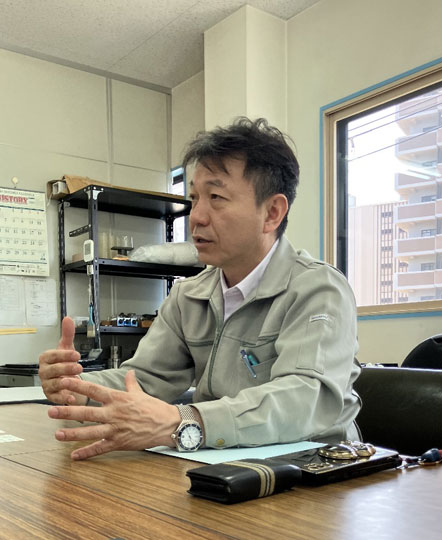
Mr. Hirami says that bringing a different breeze into the company has a positive impact on the company's structure.
The President, Mr. Hirami
What advice would you give to Japanese companies that are hesitant about hiring highly skilled foreign personnel?
All small and medium-sized companies in Japan are currently suffering from a shortage of human resources. When we say, "human resources," we tend to assume Japanese people, but this limits the pool of talent that is available.
Why are we so concerned about Japanese nationals? If someone has skills, knowledge, and experience, you should be able to hire him or her regardless of his or her nationality or language. However, "language problems" are usually cited as a barrier to hiring foreigners, for example, "It’s a problem if someone can't speak Japanese when meeting with customers”. However, if a person who can really contribute to the company with their technical ability encounters language difficulties in a meeting, this can be resolved by hiring an interpreter when needed. Besides, such personnel will eventually acquire Japanese language skills. Regardless of nationality or language, people with technical skills are valuable to a company. We should broaden the scope of recruitment without being limited to Japanese.
Another common concern is that "foreigners often quit their jobs quickly”. But I would like to ask: Why does this happen? Have the explanations and instructions given by Japanese staff been clear enough? Have the details of plans and goals been sufficiently shared? This is something I have learned from hiring foreign staff. For example, let’s assume there is an instruction to "climb Mt. Fuji". Different people have different images of the "climb" destination: some may assume it means, "Just climb to the fifth station", while others may take it to mean, "You must climb to the top”. These differences lead to misunderstandings, which interfere with work, resulting in lower evaluations and discouragement. Therefore, it is important to clearly share specific objectives from the beginning to avoid misunderstandings. If the point to be reached is clearly understood, it will be reached even if the paths are different. I think it is important to have that kind of awareness.
It would be a great waste for employers to close their minds by focusing only on the "bad cases" you sometimes hear about hiring foreigners. Thinking about things from a broader perspective can lead to new discoveries. Hiring non-Japanese personnel and bringing in different styles and viewpoints will give employers a chance to reevaluate themselves and gain insight into how to build systems within their companies. Careful explanations and easy-to-understand instructions are not only beneficial for foreign employees, but also for Japanese employees. Things that people assume to be understood are sometimes not communicated well, even among Japanese people. The same thing is true regarding the needs of today's young people. Thanks to foreign employees, I have come to realize that careful explanations are an important improvement that will lead to increased efficiency in the overall workplace.
Furthermore, many foreigners are cheerful and pleasant. This helps to create a good atmosphere in the workplace. Although we are often just performing monotonous tasks, they contribute as mood makers by, for example, proposing barbecues for everyone when a job has been successfully completed. And they are all very diligent in their work; I think they may even be more hard-working than young Japanese people today. Having said that, hiring someone out of the blue may be too much of a leap, so why not start by accepting an intern for one or two weeks? Just trying to introduce a different breeze into your company is a good start. If you do this, I think you will find that the hurdle to hiring foreign personnel will seem surprisingly low.
Editorial postscript
“I'm going to use the conference room on the third floor now, is that okay? ... Yes, okay, thank you!" This is part of a casual conversation that Mr. Haddad had in Japanese with the office staff when he confidently met us in front of the office on the day of the interview.
We were told beforehand that he could only conduct daily conversation, but he was clearly communicating in Japanese with much greater fluency than that, and we could see that he was solidly adjusting to the workplace in a natural way. The president was impressed with Mr. Haddad's solid technical ability and sincere attitude. Making full use of his skills under the president, Mr. Haddad is experiencing the joy of manufacturing and satisfaction in his work. Above all, these two men trust each other, and I sensed that they were an ideal pairing. Nationality does not matter so long as you have the skills. I hope that other companies will have similarly rewarding encounters. I would like to thank President Hirami and Mr. Haddad for agreeing to this interview and wish them continued success in their endeavors.




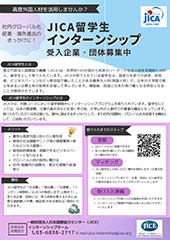
scroll